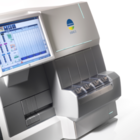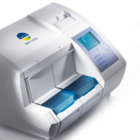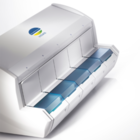VIDAS® High sensitive Troponin I
Delivering a diagnosis in only 2 hours
VIDAS® High sensitive Troponin I is a useful aid to optimize the management of Acute Coronary Syndromes (ACS).
- Compliant with current professional guidelines: total precision (coefficient of variation, CV) at the 99th percentile < 10%
- 2-hour algorithm for reliable rule-out and rule-in of acute myocardial infarction included in the package insert
- High level of performance for diagnosis and risk stratification
Necesita más información
Did you know? Every year, 16 million people worldwide die of cardiovascular diseases, specifically heart attacks or stroke (1). Chest pain is among the top 10 reasons to visit an emergency department (ED), accounting for about 5% of all ED visits (2). Expected prevalence of acute myocardial infarction (MI) in chest pain patients in the ED is between 5 and 10% for ST-segment elevation MI (STEMI) and 15 and 20% for non-ST segment elevation MI (NSTEMI)(3).
Our VIDAS® High sensitive Troponin I assay helps deliver accurate diagnosis of MI in only 2 hours for improved patient outcomes and optimized patient management in the ED.
Benefits of high sensitivity troponins
The new generation of highly sensitive troponin assays allows earlier detection of acute MI, with a shortening of the time window for serial measurement to 3 hours.
Cardiac troponin (cTn) has become a continuous variable with accurate measurement below the 99th percentile as well as small absolute changes within 1 or 2 hours. This has enabled development of algorithms for reliable rule-out and rule-in of acute MI within 2 hours(4).

As a result, high-sensitivity cTn assays are an important aid to clinicians to optimize the management of ACS:
- Diagnosis
- Mandatory tool, in addition to clinical assessment and an electrocardiogram (ECG), to make a definitive diagnosis of acute MI.
- Serial measurement to differentiate acute from chronic cardiac myocyte damage.
- Risk stratification
- Additional tool in risk stratification to guide therapeutic decision making.
Deliver high performance
Our VIDAS® High sensitive Troponin I test is an aid in the diagnosis of myocardial infarction. It is also an aid in the risk stratification of patients with symptoms suggestive of ACS with respect to relative risk of all-cause mortality and major adverse cardiac events (MACE) consisting of MI and revascularization, at 30 days.
The 99th percentile of a presumably healthy population, the recommended cut-off for the diagnosis of MI, has been defined at 19 ng/L.
The CV at the 99th percentile is equal to 7%.
Accelerate patient triage
The use of a validated 2-hour algorithm guarantees high diagnostic accuracy:
* Data from validation study in 592 patients
** Difference in cTn concentration
*** Negative Predictive Value
**** Positive Predictive Value
- Algorithm based on admission values and absolute changes within the first 2 hours.
- Delivers a diagnosis - safe rule-out and accurate rule-in - of acute MI (NSTEMI) in the vast majority (70%) of suspected chest pain patients.
- Shortens the time needed to triage chest pain patients in the ED (will obviate the need for prolonged monitoring with frequent serial blood sampling).
A complete and user-friendly solution for Emergency Care
The VIDAS® High sensitive Troponin I assay is run on the VIDAS® family of instruments. Easy-to-use and reliable, they offer rapid results and are well adapted to emergency situations.
Available on the same platform:
- VIDAS® NT-proBNP2
- VIDAS® D-Dimer Exclusion IITM
- VIDAS® B.R.A.H.M.S PCT™
References:
- Lozano R, et al. Lancet.2012;380:2095-128.
- Bandstein N, et al. J Am Coll Cardiol. 2014;63:2569-78.
- Mueller C, et al. Eur Heart J. 2015 Aug 29. pii: ehv409.
- Roffi M, et al. Eur Heart J. 2015 Aug 29. pii: ehv320.
Technical specifications for VIDAS® High sensitive Troponin I
| Reference | 415 386 |
| Tests / kit | 60 |
| Time to result | 20 minutes |
| Sample type | Serum, Plasma (Li Hep) |
| Sample volume | 200 uL |
| Calibration stability | 28 days |
Find more technical details on www.myvidas.com.
Consult your local bioMérieux representative for product availability in your country.
Related publications
- Chenevier-Gobeaux C, et al. High-sensitivity cardiac troponin assays: Answers to frequently asked questions. Arch Cardiovasc Dis. 2015;108:132-49.
- Jarolim. High sensitivity cardiac troponin assays in the clinical laboratories. Clin Chem Lab Med-2015;53:635-52.
- Thygesen K, et al. How to use high-sensitivity cardiac troponins in acute cardiac care. Eur Heart J. 2012;33:2252-7.
International Guidelines
- Roffi M, Patrono C, Collet JP, et al. 2015 ESC Guidelines for the management of acute coronary syndromes in patients presenting without persistent ST-segment elevation: Task Force for the Management of Acute Coronary Syndromes in Patients Presenting without Persistent STSegment Elevation of the European Society of Cardiology (ESC). Eur Heart J. 2015 Aug 29. pii: ehv320.
- Thygesen K, Alpert JS, Jaffe AS, et al. Writing Group on behalf of the Joint ESC/ACCF/AHA/WHF Task Force for the Universal Definition of Myocardial Infarction. Third Universal Definition of Myocardial Infarction. J Am Coll Cardiol. 2012;60:1581-98.
- Thygesen K, Mair J, Katus H, et al. Study Group on Biomarkers in Cardiology of the ESC Working Group on Acute Cardiac Care. Recommendations for the use of cardiac troponin measurement in acute cardiac care. Eur Heart J. 2010;31:2197-204.
Useful links
European Society of Cardiology
American College of Cardiology
National Academy of Clinical Biochemistry (NACB)
Find more scientific and educational resources on www.myvidas.com.







